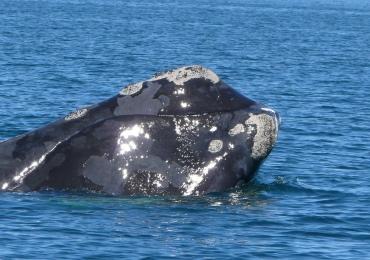
Section Branding
Header Content
Georgia Today: Renter protection laws; Mercer University AI camp; Endangered whale law delayed
Primary Content
LISTEN: On the Tuesday, July 2 edition of Georgia Today: A state law offering more protection to renters facing eviction goes into effect; Mercer University teaches kids about the ethics of AI technology; and a Georgia congressman pushes for a delay in a rule change that would protect endangered whales.

Peter Biello: Welcome to the Georgia Today podcast from GPB News. Today is Tuesday, July 2. I'm Peter Biello. On today's episode, a state law offering more protection to renters facing eviction goes into effect. Mercer University teaches kids about the ethics of AI technology. And a Georgia congressman pushes for a delay in a rule change that would protect endangered whales. These stories and more are coming up on this edition of Georgia Today.
Story 1:
Peter Biello: A challenge to voter registrations in Macon-Bibb County failed yesterday. That's the day a new state law took effect that many say was aimed at making those changes more successful. GPB's Grant Blankenship has more.
Grant Blankenship: The challenge brought by the head of the Bibb County GOP, David Sumrall, was much like his failed challenge from May. He claimed to have used the online platform Eagle AI to match people on the county inactive voter list to voters with the same names in another state, via the National Change of Address database. The now in effect law, Georgia SB 189, gives special weight to such evidence. But federal rules under the National Voter Registration Act, or NVRA, are more stringent, says Tom Ellington, one of two Democrats on the Bibb County Board of Elections.
Tom Ellington: National Voter Registration Act lays out a specific process for removing voters from the rolls. And state law does not supersede NVRA.
Grant Blankenship: And so the vast majority of the challenge failed in a vote that broke along party lines with the help of the one at-large member. For GPB News, I'm Grant Blankenship in Macon.
Story 2:
Peter Biello: The Chattahoochee Riverkeeper has filed an intent to sue the city of Atlanta over dangerous discharges from a city wastewater treatment plant. Jason Ulseth says the Clayton plant has been having major problems for months, threatening the public and the river's health.
Jason Ulseth: The intent of this 60-day notice is to put them on record that they have 60 days to get this fixed and get it fixed quickly before we see a major fish kill on the main stem of the Chattahoochee. And if they're unable to do so, then we'll take action in federal court.
Peter Biello: The city has struggled with its aging water infrastructure for decades, including in a series of headline-grabbing water outages a few weeks ago. In response to the threatened suit, the city's commissioner of watershed management defended his agency's handling of the plant and called the lawsuit a potential distraction.

Story 3:
Peter Biello: Georgia Republican congressman Buddy Carter is proposing a yearslong delay in changes to federal rules aimed at protecting vanishing whales. The new rules would expand the number of ships required to follow speed limits to protect endangered right whales and expand speed limit zones. Congressman Carter:
Buddy Carter: We care about the right whales. We need to protect the right whales, but we have to balance that with public safety and the needs for our coastal shipping economy.
Peter Biello: Conservation groups say the proposal is shortsighted and will jeopardize the whales. It's estimated around 360 of the whales remain in the wild.
Story 4:
Peter Biello: A new state law is offering new rights to rental property tenants. Bambi Hayes Brown, of the housing advocacy group Georgia Advancing Communities Together, says the law that took effect yesterday is designed to curb evictions.
Bambi Hayes Brown: Units for rent will now be required to have a warranty of habitability. It caps security deposits at two months' rent.
Peter Biello: The law also gives tenants more time to pay late rent before evictions. Meanwhile, the Atlanta City Council has approved $2 million for the city's eviction diversion program. The council voted yesterday to donate the money to the nonprofit Star-C corporation. The city says the program has prevented the eviction of more than 220 families, and more than 500 additional households have applied for assistance through the program.
Story 5:
Peter Biello: Providers of services to the homeless in Macon-Bibb County, are asking for the public's help in stocking emergency water stations. Four rec centers will serve as distribution centers for bottled drinks to help people survive the heat. Jake Hall leads United to End Homelessness, a nonprofit partnered with Macon-Bibb County government.
Jake Hall: These organizations need your support, your funding, your volunteerism. And specifically, we can use bottled water, cooling rags, sports drinks.
Peter Biello: The National Weather Service forecasts real temperatures approaching 100 degrees by the end of this week, and that is before factoring in the heat index.

Story 6:
Peter Biello: Whether we like it or not, artificial intelligence or AI is already a part of our everyday lives, and that is also true for kids who probably never will know a time without AI. So how do you teach kids to use AI effectively and even ethically? GPB's Taleen Hanna has more from an AI day camp at Mercer University.
Taleen Hanna: Veteran technology teacher Joe Finkelstein stands at the front of a classroom, and across the room there are four middle school students squished on a couch, and Finkelstein is trying to get them to think.
Joe Finkelstein: So with the existing workforce, AI is going to take over maybe so much of the customer service or tech support. Should we not use AI just for the sake of giving more people jobs?
Taleen Hanna: Students don't really have a clear answer because they're just learning to think this through.
Student: We can some app and not all of it.
Taleen Hanna: That's why they're at this weeklong day camp. Lawson Searles is a rising sixth grader, and he said that the week began by learning how to use prompts. A counselor, Ian, played the part of an AI with peanut butter and jelly in its bag. The campers prompted it to make a sandwich.
Lawson Searles: We were commanding him how to actually make the sandwich in itself.
Taleen Hanna: In their first attempt, they told it "put peanut butter on the bread."
Lawson Searles: He literally put the peanut butter container on the bread.
Taleen Hanna: That's not really a sandwich. So the kids learned that prompting an AI is harder than it looks.
Lawson Searles: We learned that we have to be specific when giving commands or prompts in order to get exactly what you need.
Lawson Searles: Can we share my AI Ian song?
Taleen Hanna: Searles thought it was hilarious. So he prompted AI to create a song about the experience.
MUSIC: AI-generated song
Taleen Hannah: It only took the AI one minute to make that song.
MUSIC: AI-generated song
Taleen Hanna: And that's the fun stuff. But Joe Finkelstein says that he wants the kids to imagine more, like how I could work for them, but not to help them cheat.
Joe Finkelstein: Not to just ask AI to write their paper for them, but to use AI as maybe a resource and helping them to take their thoughts, maybe put them together better, or, you know, even correcting grammar and things like that.
Taleen Hanna: Students also talk about more serious stuff like driverless vehicles and AI's role in surveillance. All of this leads camper Christobelle Kabuye to ask, is AI used in the real world? And where does she go for answers? To the very thing she's trying to understand: AI.
Christobelle Kabuye: I'm just curious how AI is probably going to be used in the future, because most likely it's going to be used a lot more. Key applications, healthcare, finance, retail, manufacturing.
Taleen Hanna: If she's right, it will largely be her generation deciding where and how AI is used. For GPB News, I'm Taleen Hanna in Macon.
Story 7:
Peter Biello: The Atlanta City Council has approved a $2 million settlement for two college students who were shocked with Tasers and pulled from a car in 2020. The confrontation happened while the students, Messiah Young and Taniyah Pilgrim, were stuck in downtown Atlanta traffic caused by protests. They sued, arguing the police had no justification for the traffic stop. The city council voted 13 to 1 yesterday to approve the settlement. Lawyers for Young and Pilgrim, in statements applauded the city's decision to settle.
Story 8:
Peter Biello: Georgia is home to mosquitoes that carry the West Nile and encephalitis viruses. But local health officials are warning of mosquito-borne diseases acquired abroad. GPB's Ellen Eldridge has more.
Ellen Eldridge: The Centers for Disease Control and Prevention say case numbers for the dengue virus are the highest they've ever seen. While the mosquito-borne illness is not known to spread in Georgia, it is acquired abroad. Dr. Cherie Drenzek is an epidemiologist with the Georgia Department of Public Health. She says the Virgin Islands and Puerto Rico present the most risk.
Dr. Cherie Drenzek: Because a lot of people travel to these areas. Again, it's important to try to think about mosquito bite prevention while traveling, as well as here at home in Georgia while you're outside as well.
Ellen Eldridge: Drenzek says Georgia is also seeing a fair number of malaria cases that are also travel related. For GPB News, I'm Ellen Eldridge.

Story 9:
Peter Biello: A BET spokesperson says an audio malfunction led to large portions of Usher's acceptance speech of a lifetime achievement award being muted. The 13-minute, heartfelt speech was largely censored by the network. A full version of the speech is now available on BET's YouTube channel, with a few profanities removed. Much of his speech centered on fatherhood, forgiveness, and his three-decades-long career.
Story 10:
Peter Biello: Summer is heating up, and maybe that means you're spending some time inside catching up on your favorite shows. Netflix just came out with season two of The Mole, a high-stakes competition show where 12 players work together to add money to a pot. Only one of them will win it all, while one mystery player works to sabotage the game. The host for the season is NPR's All Things Considered host Ari Shapiro, GPB's Pamela Kirkland spoke with him to get all the details on the new season.
Pamela Kirkland: Let's start talking about The Mole. For listeners who aren't familiar with the series, can you just give us a brief overview of what the competition entails?
Ari Shapiro: Okay. I've been obsessed with this show for more than 20 years because it started on ABC, hosted by Anderson Cooper, and Netflix rebooted it with the same concept, which is basically you've got 12 players who are competing as a team to add money to the pot, but one of the 12 is secretly working against the team, to sabotage them, and so everybody has to try to figure out who is the mole. And at the end, only one of them will win the pot. But one of the things that I love about the show is that every season is set in a different country, and every episode is in a different location. So it's this incredibly kind of glamorous game of sabotage and intrigue where you're going from jungles to skyscrapers to tropical islands. I always thought it would be so thrilling to be a contestant on the show, and now I somehow get to be the host.
Pamela Kirkland: I mean, it seems like you are having a great time on the show as the host. What really attracted you to it? I watched the original as well. But what made you say, "this is on my bucket list. I've got to do this."
Ari Shapiro: Well, first of all, the places we go are just spectacular. And I had never set foot in Malaysia. And over the course of the six weeks of filming, we got to see so many places that are off the typical tourist track. But I also think that, like as a journalist, I am constantly asking "who's lying to me? Who's telling me the truth? Am I getting spun?" And that's the question at the heart of this game, because the mole is lying and other people might be playing a complicated game where they're pretending to be the mole and are just blah, blah, blah. So that aspect of like, who is telling the truth and who is lying really sits right squarely in my zone of experience as a journalist. The great thing is, on a show like The Mole, the stakes are low. You know, like when a White House spokesperson is lying to you about a war, the stakes are very high. When someone is lying to you about whether they actually sacrifice money from the pot to get themselves an exemption, like, that's just fun. So you can play with these, like, high-stakes questions of who's lying, who's telling the truth in a much lower-stakes environment in a spectacular setting. That's what I loved about it.
Pamela Kirkland: And I was going to say, you have to pull on some of that journalistic background because you, like the viewers, don't know who the mole is. So you're kind of going through this experience with us, and you have to stay neutral, no matter whether or not you have a hunch it might be one person or another.
Ari Shapiro: I was really relieved when they told me that I wasn't going to know who the mole was, because if I did know, I would have been terrified to let on. I did — I did do a thing where often I would sort of walk into the scene and I would say, "Hello, players; hello, mole." And it was just a little line I came up with. I want to remind people that the mole is not some abstract idea, but actually like one of the people sitting in front of them. So I would walk in and I would say, "Hello players; hello, mole." And when I said "hello mole," I would look at someone specific: just anyone, random, one of the players, and they got obsessed with like, "oh, when Ari said 'hello, mole,' he was looking at so-and-so!" Like, I didn't know who it was. I had my own theories, which were often wrong, but it was just fun to kind of mess with them a little bit.
Pamela Kirkland: And it's coming out at the perfect time because, you know, summertime, it's hot. Sometimes you just want to chill in front of your TV and maybe binge a little bit. No spoilers, but besides taking us to these beautiful destinations, what can viewers expect from this season of The Mole?
Ari Shapiro: There are so many twists and turns. There are highs and lows. You know, I told you that people are kind of building up the pot, but many of the missions are designed to force people to choose between helping themselves and draining the pot, or helping the team and adding to the pot, and that tension between doing something as a team and looking out for yourself is the tension that plays out through all 10 episodes. And so, you know, without giving any spoilers, the pot fills up and the pot drains down. (Laughs) Then It fills again, and it's like the lurching of a roller coaster to watch this. And hopefully people really feel — I absolutely felt in some of those moments, like, "did that really just happen? Did somebody really just do that?" And I was like, "yes, they did." And it was intense. Like, the emotions are real. Oh, I loved it. I had a great time.
Peter Biello: And you can see Ari Shapiro in action in season two of The Mole, now available on Netflix.
Story 11:
Peter Biello: In sports. The Atlanta Braves face the San Francisco Giants at home tonight for the first of a three-game series. Reynaldo Lopez is scheduled to start. He's got a 1.70 ERA on the season with a 6 and 2 record. In his last three appearances, he's allowed only 13 hits and struck out 19. Starting for the Giants is Hayden Birdsong, who struck out five and 4 2/3 innings in his major league debut recently. Tonight's game will be his first road start. And Atlanta Dream forward Laeticia Amihere has been named to the 2024 Canada women's national basketball Olympic team. Amihere will join teammate Rhyne Howard in Paris, and is the first Dream player to represent Atlanta at the Olympics in 5-on-5 women's basketball since 2016. The Dream face the Chicago Sky at home tonight.
Peter Biello: And that is it for this edition of Georgia Today. If you want to learn more about any of these stories, visit our website, GPB.org/news. And subscribe to this podcast, and we'll be back in your podcast feed tomorrow with all the top stories from Georgia. And if you've got feedback or a story idea we should know about, please let us know by email. The address is GeorgiaToday@GPB.org. I'm Peter Biello. Thank you so much for listening. We'll see you tomorrow.
---
For more on these stories, go to GPB.org/news



